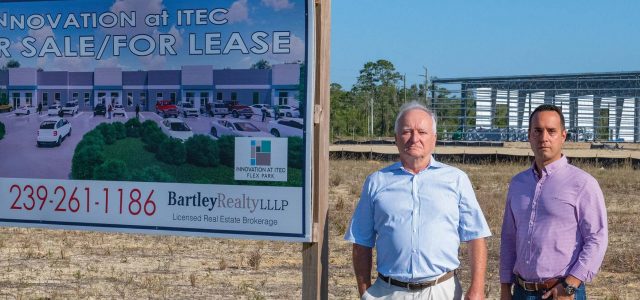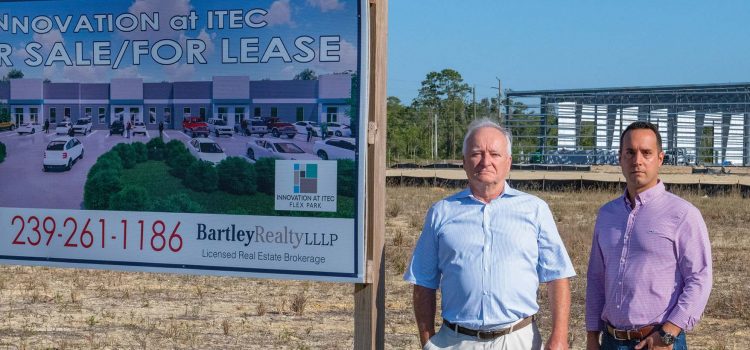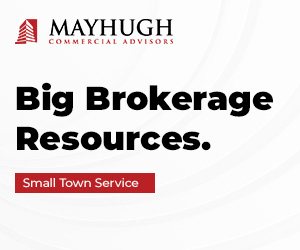


Timing is everything in real estate. Just ask Paul Hardy, the longtime Southwest Florida developer whose 240-acre Alico ITEC Business Park will benefit from the area’s economic recovery. ITEC stands for innovation, technology, enterprise, and commerce and is situated off Alico Road, east of I-75, south of Southwest Florida’s International Airport. Recently, the area has had a surge of interest from companies seeking to expand in the region because of the proximity to the interstate and location in Southwest Florida.
Despite its prime location near major transportation thoroughfares and landmarks, the park was ahead of its time when first envisioned. Hardy’s intuition on area growth is key to his continued success. Previously owning the land in 2007, Hardy sold out after taking it through the entitlement process, leaving the subsequent owners bedeviled by the economic downturn of 2008 to 2012. In 2018, after struggling to spark interest in the park, the new owners sold the land back to Hardy. “We knew the property inside and out,” says Hardy, who with his son-in-law, Christopher Pisano, now expects to sell the remaining 106 acres by the end of the year, thanks to strong demand for industrial land.
Business associates of Hardy say he has a keen sense of where growth will occur in the market. “I’ve known Paul for 30 years, and he’s always looking into the future,” says Brian Howell, vice president of Phoenix Associates of Florida, a Naples’ design-build firm constructing buildings at ITEC. “When I started working with Paul on this park two years ago, I told him it’s going to take off like you have never seen,” Howell recalls. Phoenix is building two buildings now at the park and is poised to break ground on at least four more. In particular, Howell notes that ITEC is well-positioned to attract users who want to serve Collier County, where industrial land is virtually nonexistent because it’s all been built out. “If we want industrial space, we have to go north,” says Howell.
INDUSTRIAL DEMAND
Southwest Florida’s boom in newhome construction and the shift to online deliveries because of the pandemic have boosted industrial warehouse space demand. In addition, manufacturing companies from the Midwest and Northeast are scouting Southwest Florida to escape the high taxes and regulatory burdens that hamper their businesses up north.
With industrial vacancies in the low single digits and a dearth of speculative construction in Southwest Florida, expanding companies have little choice but to build their own space or contract development companies for long-term leases in build-to-suit buildings. Much of the existing industrial space was absorbed in recent years. What’s left is usually obsolete and can’t accommodate today’s trucks and trailers.
“I’m very glad to see industrial gaining traction because it gives the economy more resiliency. If there is a good solid industrial base, then you get manufacturing and the good-paying jobs that come with it,” says Hardy.
The ITEC property can accommodate a total of 2.4 million square feet of space. There are already several large companies expanding here. They include hurricane shutter manufacturing company, Advanced Hurricane Technology and a luxury auto-storage facility called My ITEC Place. “One of the sought-after prospects is a distribution-warehouse facility in the 250,000- to 300,000-square-foot range,” Hardy says. “That’s big enough to fill more than five football fields.”
Although ITEC is a success, marketing the land for industrial use is unlike what the previous owners envisioned. When Hardy sold the park in 2007 to former CBS President John Backe and developer Rich Galvano, the two worked closely with Florida Gulf Coast University to develop ITEC into a research park. Despite constructing a 25,000-square-foot building that housed the university’s Emergent Technology Institute, the efforts didn’t spark additional development.
Even though the park is now marketed for industrial uses, Hardy believes the modern university office building and the lush landscaping give it a more upscale appearance than most drab industrial parks, reinforcing the need for facilities to look good and setting a high architectural bar for ITEC.
ROADS ARE KEY
Savvy real estate investors understand that roads are critical to any development’s success, especially for an industrial park where tenants need easily accessible thoroughfares to transport goods and services. In this case, the recent widening of Alico Road provided the opening that ITEC required for success.
The area is now well-recognized for its central location. A growing number of corporations recently selected other parks in the area for new facilities, including NeoGenomics, Conditioned Air, and Scottlynn. Moreover, Airport Haul Road at ITEC’s western boundary is underutilized and is expected to be a future thoroughfare for passengers and goods traveling to the airport. Southwest Florida International Airport plans to build a second runway that will accommodate an interchange off Airport Haul Road, similar to the one at Fort Lauderdale International Airport.
Additionally, widening Alico Road accelerated nearby residential developments such as WildBlue and Esplanade, prompting ITEC to sell retail land fronting Alico Road to shopping center tenants. ITEC is likely to include a 68,000-square-foot strip center to cater to area residents who currently drive to Ben Hill Griffin Parkway for their shopping needs.
FOUR DECADES OF PERSPECTIVE
Hardy, who shuns titles and prefers shorts and Crocs for his work attire, has been a developer in Southwest Florida since 1982. Some of the area’s best-known and most successful luxury residential developments bear his signature, including Worthington Country Club, Grandezza, The Strand, and Olde Cypress.
Hardy resumed development after the recession by acquiring and developing distressed properties in North Fort Myers and Cape Coral as a land investor with a knack for prescient timing. Backed by a single investor, Hardy successfully assembled land in the path of development.
Today, Hardy is optimistic about the area’s economic recovery for several reasons. A growing industrial base means diversification away from the volatile tourism and residential real estate industries that have dominated Southwest Florida. “We’re going to be in much better shape” to withstand any economic shock, he says. Another reason he’s confident is that banks have been conservative in underwriting projects. Unlike the previous boom, banks are now careful to lend only on the most promising projects and generally shun riskier speculative projects.
As always, there are challenges involved in any new development. For example, the rising costs of construction materials and labor due to the pandemic-induced supply constraints and are expected to boost rents. Furthermore, obtaining building permits can slow construction by as much as a year. However, Hardy is circumventing that obstacle by applying for permits in advance so developers can move dirt right away. “This is no different than anything else; end-users want instant gratification,” Hardy chuckles. He’s there to deliver.








